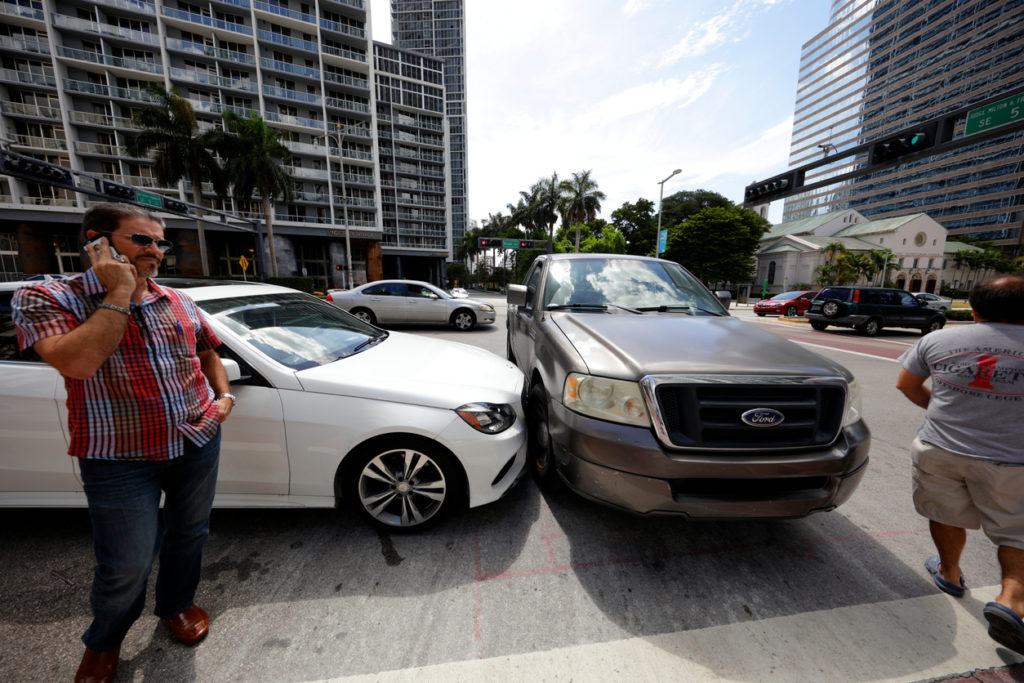Have questions about Florida PIP law? Our personal injury lawyers are experts in this area and we have the answers to all of your questions. Like every state, Florida has requirements for auto insurance that drivers have to abide by, and insurance companies will typically sell only policies that meet the requirements. In Florida, one of the requirements is Personal Injury Protection (PIP), also called No-Fault Coverage.

The Cliff Notes: Key Takeaways From This Post
We laid out a guide on Florida PIP Law; however, here are the key bullet points if you are in a rush:
- Personal Injury Protection (PIP) is a form of no-fault insurance required in the state of Florida.
- It covers medical expenses, lost wages and replacement services up to $10,000 for the driver and anyone riding in their car who lives at the same address.
- PIP will also cover non-emergency injuries, but only up to 25%.
- MedPay is a supplemental form of coverage for medical expenses up to $5,000 that may help pay for the 20% of costs PIP won’t cover.
- Injuries must be treated within 14 days to qualify for PIP coverage.
- A personal injury lawyer can help ensure a claim is properly filed and that you receive all of your entitlements under Florida law.
What is PIP?
PIP is generally required in No-Fault states, including Florida. The purpose of PIP is to reduce the number of lawsuits. Personal injury protection is thus designed to ensure that your medical bills are covered without the need to sue the other driver over small amounts.
After an accident, regardless of who was responsible, PIP will cover your medical expenses up to its limit. In Florida, it is considered the primary payer, that is to say, it is the first source turned to by medical providers to cover your expenses. This can help keep your health insurance from being impacted by an accident.
Who is Covered by PIP?
PIP covers the driver, and will also cover you if you were riding in somebody else’s car, or if you were struck by a vehicle as a pedestrian or bicyclist. Personal injury insurance will also cover family members who reside at the same address, and everyone who has access to the car should be listed on your insurance policy as a driver or excluded driver. PIP will also cover anyone who was a passenger in your car. It will cover you if you are driving a car you do not own, such as a rental.
What are the Limits of PIP?
In Florida, Personal Injury Protection pays 80% of medical bills, 60% of lost wages, and 100% of replacement services – that is to say, things you might need to compensate for the loss of ability from the accident. PIP covers most medical costs, but may not cover alternative medicine and other fringe benefits. It does cover treatment by a chiropractor or dentist. It does cover medical and surgical services, medication, diagnostic services, ambulatory services, and rehab.
Non-Emergency Injuries
For non-emergency injuries, such as whiplash, PIP will only pay 25%. There is a specific definition of emergency under the law, but it boils down to a condition that might cause serious jeopardy to health, impairment to bodily function, or dysfunction of a bodily organ or part if not treated immediately. However, there is some uncertainty about whether the adjuster can call it an emergency if the doctor avoids using the words “emergency medical condition.” Thus, you should try to get your medical provider to put those exact words in the chart.
In theory, non-emergency injuries are covered by your health insurance; this may not always be the case, however, and it is worth making sure your health insurance will cover auto accidents. In some cases, PIP will cover your deductible. Also, PIP only covers injuries treated within 14 days of the crash. This means it is very important to seek medical attention right away (and also legal advice in case you need to recover damages from the other driver).
Premiums
Florida law sets specific amounts for PIP. The coverage amount is $10,000, and you cannot get PIP for a higher or lower amount. You can lower your premiums by setting a higher deductible, but the maximum is $1,000. Some people also save money by excluding lost income or limiting PIP coverage to themselves. PIP also provides a $5,000 death benefit to cover funeral expenses. It will also payout for “replacement services,” which means if you have to hire somebody to clean your house or walk your dog because of your injury, PIP can cover those costs.
Once your PIP coverage is exhausted, then you have to turn to other measures, including uninsured motorist coverage.
Medical Payment Coverage Under Florida PIP Law
Medical Payment coverage or MedPay is often confused with PIP. However, it is not quite the same thing. MedPay will give you up to another $5,000 worth of coverage for a relatively low premium and will help pay for the 20% of your costs PIP won’t cover if health insurance won’t. It can also cover your PIP plan’s deductible.
However, MedPay can only be used to cover medical expenses. Given the low cost, though, it’s worth adding for most drivers, especially with the high costs of health care.
How to File a Personal Injury Claim After an Accident
As already mentioned, treatment for injuries has to start within 14 days. This is to prevent people from trying to use PIP to deal with random medical expenses their health insurer is being difficult about covering.
Your insurer has to pay within 30 days but has 60 days to investigate your claim. This does bring about the risk that your insurer will ask for the money back. Having a good personal injury lawyer on your side can help prevent this. They can help you present your case in such a way that it’s less likely to be denied.

You should keep a log of all of your medical expenses. If filing a claim for lost income, then your employer will need to fill out something called a “Wage and Salary” verification, which shows your wages in the 13 weeks prior to the accident. Your doctor will also need to give you a note saying why you are unable to work.
You are legally required to file a claim under PIP rather than your health insurance. Bear in mind that your insurance company can have you examined by a medical provider of their choice.
You should make sure your medical provider knows who your PIP provider is at the time of treatment and that this is a result of an accident where PIP applies, so as to make sure that they bill the right insurance company. Your health insurance company is not able to cover claims that should have been made under PIP, and the claims limit can easily expire before this is sorted out between the hospital and your insurance.
Can You Still Sue Under Florida PIP Law?
The answer is: Yes, according to Florida PIP law, you can still sue the other driver under certain circumstances. Specifically, you can sue the other driver if your medical expenses exceed the $10,000 covered by PIP. You can also sue if your injuries are disfiguring or likely to cause permanent disability or both. In many states there is only the injury requirement, making Florida more generous. As you have no idea how much your medical bills may amount to, you should contact a lawyer right after the accident, even if you think PIP will cover all of your costs. A personal injury law firm with extensive PIP experience can help address disputes with your insurance company.
Thus, if you have a $25,000 medical bill, you can get the first $8,000 covered by PIP, the next $5,000 by MedPay, and then theoretically sue the other driver for the remaining $12,000, as well as for pain and suffering. This also means that the excess amount may/should be covered by Uninsured Motorist coverage. It’s a very good idea to get as much of both uninsured motorist and liability coverage as you can afford.
If you have good bodily injury insurance you can avoid ending up in court if another driver elects to sue you for damage. Many of these cases are settled out of court, although a lawyer is still necessary to get the best settlement possible. Never agree to a settlement quickly or on the spot; some insurance companies will pressure you to agree to one right after the accident so that you don’t get the full amount you might be entitled to. This is less common in No-Fault states but still happens.
Is PIP Expensive?
The state average cost for PIP in Florida ranges from about $300 to $400 a year for a thirty-year-old driver. Since it is mandatory under Florida PIP law, there is no way to avoid these costs, but you can shop around different insurance companies to get a good deal. You can also opt for a higher deductible. Opting out of economic benefits generally has only a small effect on your premiums and is seldom worth the savings.
Make sure before opting for a higher deductible, that you can reasonably pay it along with whatever bills your PIP won’t cover. Too many people opt for a high deductible to save money now and end up regretting it later. Bear in mind that your health insurance can’t be used to cover your PIP deductible.
Remember, PIP is mandatory in Florida. Ideally, your insurance company should explain this coverage to you and how it works, but this does not always happen. It may well be presented to you as simply part of the bundle with no more information given. As PIP can be confusing, it may be beneficial to talk to a lawyer to get a better understanding of the law as it applies to you specifically, particularly if you have a large household, teenage drivers, and/or multiple cars.
If you have a question about your PIP coverage or have been in an accident and are not sure how to properly file a claim, you should contact Herman & Wells for a free consultation.
